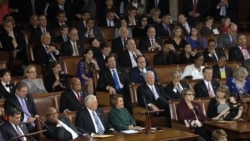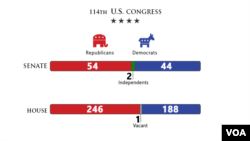On the first day of business for the new, Republican-led U.S. Congress, House Republicans promptly displayed political divisions within their caucus, and the first major bill on the Senate’s agenda triggered a veto threat from Democratic President Barack Obama.
Representative John Boehner of Ohio easily won a third term as House speaker, despite challenges from conservative hard-liners who accuse him of being too accommodating with Democrats. More than two dozen of the speaker’s fellow Republicans voted for someone other than him, or declined to vote at all.
On the other side of the Capitol, Vice President Joe Biden swore in new and re-elected senators. They included a large contingent of Republican freshmen whose November victories gave their party control of the chamber.
"We know a lot of hard work awaits," said Senator Mitch McConnell of Kentucky, the new majority leader. "We know many important opportunities await, as well. I am really optimistic about what we can accomplish.”
That optimism will be put to the test when the chamber considers legislation pertaining to a pipeline that would transport Canadian oil to the U.S. Gulf region.
Last year, the Senate rejected the Keystone XL Pipeline, and the White House said Tuesday that Obama would veto the measure if approved by Congress. But that was not deterring backers, such as Republican Senator John Hoeven of North Dakota.
“With Canada and the U.S. working together, we can produce more energy than we consume," Hoeven said. "That helps us, that helps families and businesses, that makes our economy more competitive. It puts real pressure on places like Russia and Iran.”
The pipeline is opposed by environmentalists, an important constituency in the Democratic Party.
That factionalism and partisanship were on display on the first day of the new Congress was no surprise to political analyst William Howell of the University of Chicago.
“For the most part, I think what we are going to see is continued gridlock," he said. The "stopping point" for policy initiatives that Obama and the Democratic Party favor was formerly in just the House but now is "going to be in both chambers."
For the last four years, Republicans controlled the House and Democrats held the Senate. Now, the political divide is between the White House and Capitol Hill.







